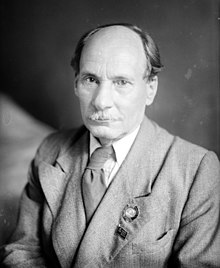Yakub Kolas
You can help expand this article with text translated from the corresponding article in Belarusian. (May 2023) Click [show] for important translation instructions.
|
Yakub Kolas Якуб Колас | |
|---|---|
 | |
| Born | Kanstantsin Mihaylavich Mitskievich November 3 [O.S. October 22] 1882 Akinchytsy, Minsk Governorate, Russian Empire |
| Died | August 13, 1956 (aged 73) Minsk, Byelorussian SSR, Soviet Union |
| Occupation | Writer, dramatist, poet, translator |
| Nationality | Belarusian |
| Period | 1906–1956 |
Yakub Kolas (also Jakub Kołas, Belarusian: Яку́б Ко́лас, November 3 [O.S. October 22] 1882 – August 13, 1956), real name Kanstantsin Mikhailovich Mitskievich (Канстанці́н Міха́йлавіч Міцке́віч, Russian: Константи́н Миха́йлович Мицке́вич, Polish: Konstanty Mickiewicz) was a Belarusian writer, dramatist, poet and translator. People's Poet of the Byelorussian SSR (1926), member (1928) and vice-president (from 1929) of the Belarusian Academy of Sciences.[1]
In his works, Yakub Kolas was known for his sympathy towards the ordinary Belarusian peasantry. This was evident in his pen name 'Kolas', meaning 'ear of grain' in Belarusian. He wrote collections of poems Songs of Captivity (Russian: Песни неволи, 1908) and Songs of Grief (Belarusian: Песьні-жальбы, 1910), poems A New Land (Belarusian: Новая зямля, 1923) and Simon the Musician (Belarusian: Сымон-музыка, 1925), stories, and plays. His poem The Fisherman's Hut (Belarusian: Рыбакова хата, 1947) is about the fight after unification of Belarus with the Soviet state. His trilogy At a Crossroads (Russian: На перепутье, 1925) is about the pre-Revolutionary life of the Belarusian peasantry and the democratic intelligentsia. He was awarded the Stalin Prize in 1946 and 1949.[1]
Biography
Kanstantsin Mitskievich was born in November 3 [

In his honor, the Yakub Kolas Square and the Yakub Kolas Street in the center of Minsk bear his name.[1]
Bibliography
Biographies
- Вялікі пясняр беларускага народа. Зборнік артыкулаў аб жыцці і дзейнасці Якуба Коласа. Мінск, 1959.
- З жыццяпісу Якуба Коласа: Дакументы і матэрыялы / Уклад., уступ. артыкул і імян. паказ. Г. В. Кісялёва; Рэд. В. В. Барысенка, М. І. Мушынскі. Мінск, 1982.
- Казбярук У. М. Колас Якуб // Беларуская энцыклапедыя. У 18 т. Т. 8. Мінск, 1999. С. 382—384.
- Лужанін М. Колас расказвае пра сябе. Мінск, 1982.
- Мацюх М. Д., Мушынскі М. І. Колас Якуб // Беларускія пісьменнікі: Біябібліягр. слоўн. У 6 т. Т. 3 / Ін-т літ. імя Я. Купалы АН Рэспублікі Беларусь, Беларус. Энцыкл.; Пад рэд. А. В. Мальдзіса. Мінск, 1994. С. 299—304.
- Мушынскі М. І. Коласазнаўства // Беларуская энцыклапедыя. У 18 т. Т. 8. Мінск:, 1999. С. 386—387.
- Мушынскі М. І. Якуб Колас: Летапіс жыцця і творчасці. Мінск, 1982.
- Мушынскі М. І. Летапіс жыцця і творчасці Якуба Коласа. — Мінск: Беларуская навука, 2012. — 1127 с. — ISBN 978-985-08-1460-9.
- Навуменка І. Я. Якуб Колас: Нарыс жыцця і творчасці. Мінск, 1982.
- Разам з народам. Матэрыялы юбілейнай навуковай сесіі АН БССР, прысвечанай 100-годдзю з дня нараджэння Янкі Купалы і Якуба Коласа / Пад рэд. І. Я. Навуменкі. Мінск, 1983.
- Тычына М. Колас Якуб // Энцыклапедыя гісторыі Беларусі. У 6 т. Т. 4. Мінск, 1997. С. 225—227.
- Якуб Колас: Да 100-годдзя з дня нараджэння. Біябібліягр. паказ. / Склад. Н. Б. Ватацы, М. І. Пратасевіч, Н. А. Адамовіч, А. Б. Дунаеўская; Рэд. В. П. Рагойша. Мінск, 1983.
- Янка Купала і Якуб Колас у кантэксце славянскіх літаратур. — Мн., 2002.
References
- ^ "Якуб Колас". Центральная научная библиотека НАН Беларуси (in Russian). Retrieved May 13, 2023.
External links
 Media related to Yakub Kolas at Wikimedia Commons
Media related to Yakub Kolas at Wikimedia Commons
